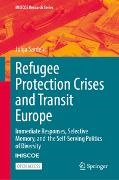Ulteriori informazioni
This open-access book presents a socio-legal analysis of immediate responses to large-scale refugee displacement in Europe after the 1951 Refugee Convention came into force, focusing on the countries to which refugees initially fled or through which they passed (namely Austria and, initially, Yugoslavia, followed by several of the former Yugoslav countries). First, it investigates the immediate responses to refugee movements following the suppression of the 1956 Hungarian Revolution by Soviet troops. Second, it examines the responses to individuals seeking asylum after being displaced during the post-Yugoslav wars of the 1990s. Third, it analyses the responses of the same countries to refugees fleeing Global South countries (predominantly Syria, Iraq, and Afghanistan) in 2015 and 2016. Finally, it explores how these countries responded to the mass displacement of refugees from Ukraine. The book argues that these countries have positioned themselves as “transit” or temporary protection countries in order to avoid assuming long-term responsibility for a larger number of refugees. As a consequence, they granted various forms of temporary legal status to refugees that differed from the refugee status defined in the 1951 Refugee Convention. These legal statuses were hierarchical (in terms of the rights attached to them) and racialized, with the fewest rights granted to refugees from the Global South and other negatively racialized groups. The book traces the usage of self-serving politics of diversity and selective memory to legitimise why refugees could not be protected long-term in these countries, and also why there were such differences in treatment of refugees.
Sommario
Chapter 1. Introduction.- Chapter 2. A Model response?.- Chapter 3. Constructing Temporary Protection.- Chapter 4. Hyper-Temporariness and Transit Migration.- Chapter 5. The Return of Limited, Conditional, and Selective Temporary Protection.- Chapter 6. Conclusion.
Info autore
Dr Julija Sardelić is Senior Lecturer at Te Herenga Waka - Victoria University of Wellington. Her research encompasses broader themes of citizenship and migration, but she particularly focuses on how different states create hierarchies among citizens, refugees, and other forced migrants, as well as legally invisible and stateless persons. Before her current position, she held postdoctoral positions at the University of Leuven, the University of Liverpool, and the European University Institute. Her publications include a monograph The Fringes of Citizenship (Manchester University Press), a book chapter “The Refugee Crisis and the Reimagined Politics of Belonging: Political Discourses on the Western Balkan Route” (Ibidem) and a working paper “From Temporary Protection to Transit Migration: Shifting Responses to Refugee Crises” (EUI RSCAS Global Governance Programme).
Riassunto
This open-access book presents a socio-legal analysis of immediate responses to large-scale refugee displacement in Europe after the 1951 Refugee Convention came into force, focusing on the countries to which refugees initially fled or through which they passed (namely Austria and, initially, Yugoslavia, followed by several of the former Yugoslav countries). First, it investigates the immediate responses to refugee movements following the suppression of the 1956 Hungarian Revolution by Soviet troops. Second, it examines the responses to individuals seeking asylum after being displaced during the post-Yugoslav wars of the 1990s. Third, it analyses the responses of the same countries to refugees fleeing Global South countries (predominantly Syria, Iraq, and Afghanistan) in 2015 and 2016. Finally, it explores how these countries responded to the mass displacement of refugees from Ukraine. The book argues that these countries have positioned themselves as “transit” or temporary protection countries in order to avoid assuming long-term responsibility for a larger number of refugees. As a consequence, they granted various forms of temporary legal status to refugees that differed from the refugee status defined in the 1951 Refugee Convention. These legal statuses were hierarchical (in terms of the rights attached to them) and racialized, with the fewest rights granted to refugees from the Global South and other negatively racialized groups. The book traces the usage of self-serving politics of diversity and selective memory to legitimise why refugees could not be protected long-term in these countries, and also why there were such differences in treatment of refugees.

